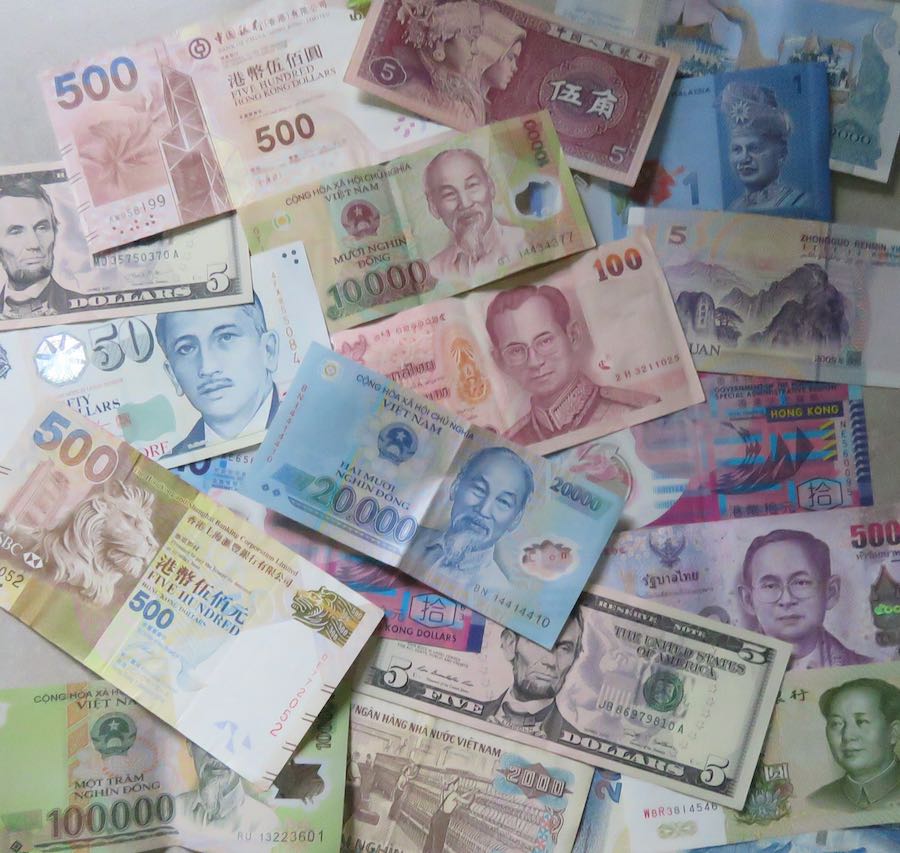One of the annoyances of travel and even more so with business (for digital nomads or expats) is converting money between currencies. It actually is fairly easy now for a traveler but can be costly. When you have a business and need to convert between currencies it can be very costly.
Using ATMs to get cash in the local currency normally give better rates than you can get in most other ways. And you are unlikely to be outright swindled any more than large banks do (which if you follow the news is a great deal, scandal after scandal of illegally taking from customers in violation of the law). The transaction costs of ATMs can be ludicrously high. In Thailand all banks seemed to have agreed to charge foreign cards $6 for a transaction. That is crazy. But you don’t have much leverage.
Schwab, and a few other, financial institution will reimburse you for ATMs fees. Many digital nomad and international travelers make sure to get such an ATM card which is wise.
And you can occasionally find banks that are must more customer friendly. The MayBank in Siem Reap, Cambodia didn’t have ATM charges for me. And I found a bank in Hoi An, Vietnam that didn’t charge either (I can’t remember the name). It may well be that they just didn’t charge do to deals between the banks so I don’t know who else it would work for.
Even though the currency exchange rates are normally not too bad on ATMs or using a credit card they are still weighted in the banks favor. And I don’t know of any banks that disclose how wide a profit margin they take for simple currency transactions (and I am sure it fluctuates depending on the situation).
When you need to transfer money (for example if you are paid in US$ but have a bank account elsewhere or if you are making a big purchase in another location) and convert currencies you can find the financial institutions taking advantage of you. There are several currency exchange services that have stepped into this business opportunity created by the large margins financial institutions have been taking from their customers.
One such service is Transfer Wise. As Transfer Wise says “Banks charge 5% in hidden fees. People on TransferWise pay 0.5%.” While banks might want to argue they don’t disclose the hidden fees and bad exchange rates they use so they don’t have much in the way of an evidence based argument to make.
TransferWise saves you money by matching your money at the mid-market rate. There’s just a small service fee and it’s all shown upfront. You can read more about our pricing here.
To demonstrate the possible savings you’ll get by using TransferWise, an average bank fee and exchange rate is shown. It’s based on independent research from Charterhouse Ltd, obtained on November 2014. The research looked into the costs of sending 1000GBP from a UK bank account, to another bank account in Germany. From this data, other currency route savings, fees and average exchange rates are worked out as well.
They still serve largely the USA and Europe but hopefully will expand further (they are also in India).
CurrencyFair is another good option and they posted a blog post looking at the costs of using old banks and even TransferWise – Money Transfer Companies Compared. The costs (including hidden costs of the banks are huge). The costs between these two are close (Currency Fair said at the time for express service they were significantly cheaper). CurrencyFair is actually a peer to peer service to match people needing to make transfers that balance each other out.

SE Asia, and beyond, currency: China, Hong Kong, Singapore, Malaysia, Thailand, Cambodia, Vietnam, USA. USA currency is used in Cambodia for most things and USA currency is used most airports to pay visa fees to the governments. Photo by John Hunter, see more photos of my travels.
If you are moving large amounts of money it definitely makes sense to seek out protection from old fashion banks ripping you off. These are the same banks agreeing to likely over $500 million in fines for currency manipulation (because even these huge profits on the backs of customers couldn’t satisfy bankers demands for multi-million dollar bonus for hundreds of employees at these banks every year).
CurrencyFair offers a peer to peer marketplace that lets you set a offer price and if someone agrees you can even been market exchange rates. Of course, if your currency happens to be a bit under-demand at the time you may get a bit less than market price. TransferWise sets the price based on the forex markets and then it is just up to supply on the demand on their marketplace to determine if you can find someone to take the other side of the trade.
Related: Negative Interest Rates and the US Dollar – Finding an International Business Bank as a Digital Nomad – Credit Card Currency Conversion Costs – MicroFinance Currency Risk – Why the Dollar is Falling (2009)








